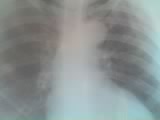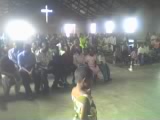


WHO Regional Consultation on the preparation for the Moscow Ministerial Meeting and the UN High Level Summit on Non Communicable Diseases.
Event: AFRO Consultation meeting
Place: Brazzaville, Republic of Congo
Date: April 4-6, 2011.
Slogan: Uniting against NCDs, the time to act is now.
The meeting has been held as planned, all attendees arrived in Brazzaville on April 3, 2011. The meeting was scheduled in 2 phases:
1. The first two days (4-5 April 2011) were dedicated to a technical meeting whose focus was to prepare the Ministerial meeting which took place on 6 April 2011.
2. The Ministerial meeting which has been attended also by all the experts of the technical meeting.
At the second day of the technical meeting, a round table has been conducted by civil society organizations including American cancer society, UICC, ATCA for cancers and other organizations for other fields of NCDs. We have defended our position and the voice of cancer has been head. (See details in the meeting report pages 26-30).
At the end of all sessions, the Brazzaville declaration has been adopted and has 11 points:
1. In WHO African Region, cardiovascular diseases, diabetes, cancers, chronic respiratory diseases, haemoglobinopathies (in particular sickle cell disease), mental disorders, violence and injuries represent a significant development challenge;
2. Though not currently specified in the MDGs, NCDs form an essential part of the global, regional and national health and development agendas;
3. Heads of states and Government shall provide leadership through the participation of all government sectors, as well as partnership with civil society and community in NCDs prevention and control. The Heads of state and government should also promote good governance to prevent conflict and disruption of health services;
4. National health information systems should be strengthened and standardized to generate disaggregated data on NCDs, their risk factors and determinants and monitor their magnitude, trends, and impact;
5. Information sharing on NCDs using all appropriate means including information and communication technologies should be promoted and intensified to increase health awareness and empowerment of individuals, families and communities;
6. NCDs prevention and control strategies, guidelines, legislations, regulatory frameworks including the WHO FCTC, shall be developed and implemented to protect individuals, families and communities from unhealthy diets, harmful use of alcohol, tobacco use and exposure to tobacco smoke, food safety, prevention of violence and injuries and advertising of unhealthy products;
7. National health systems should be oriented towards the promotion and support of healthy lifestyles by individuals, families and communities within the primary health care context in order to effectively respond to complex social, cultural and behavioral aspects associated with NCDs;
8. Health systems should be further strengthened with appropriate attention to inter alia: health financing, training and retention of the health workforces; procurement and distribution of medicines, vaccines, medical supplies and equipment; improving infrastructure; and, evidence-based and cost-effective service delivery for NCDs. There is need to advocate for the integration of health in all policies across sectors in order to address NCD risk factors and determinants;
9. The management of communicable diseases in many countries including Global health initiatives can provide ample opportunities to accelerate prevention and control of NCDs. Such opportunities should be identified and harnessed to address integrated care in the context of primary health care and health systems strengthening;
10. Partnership, alliances and networks bringing together national, regional and global players including academic and research institutions, public and private sectors, and civil society shall be encouraged and supported in order to collaborate in NCD prevention and control and to conduct innovative research relevant to the African context;
11. Financial resources that are commensurate to the burden of NCD should be allocated from the national budgets to support NCD primary prevention and case management using primary health care approach and establish sustainable innovative and new financing mechanisms at national and international levels.
PARTICIPANTS HAVE COMMITTED;
12. To develop integrated national NCD actions plans and strengthen institutional capacities for NCD prevention and control;
URGE;
13. The United Nations to include NCDs prevention and management in all future Global development goals;
14. World Health Organization, partners and civil society organizations to provide technical support to Member states, for implementation, monitoring and evaluation of recommendations contained in this Declaration, and to support a process of peer review and experience sharing among member states;
15. Development partners and civil society organizations to provide new and substantive financial resources to address NCDs, while not jeopardizing current and future funding of communicable diseases;
16. Heads of state and government of the WHO Africa region to endorse this deflation and to present it at the United Nations High Level Summit on NCDs as the position of Region on NCDs;
17. The United Nations Secretary General to establish a mechanism to monitor progress of the commitments to be made at the United Nations High Level Summit in September 2011;
18. The Regional Director of WHO in the African region to include in the agenda of the Regional Committee of 2012 discussion on the regional NCDs strategic plan and report on the progress made on the implementation of this declaration to the Regional Committee in 2014.
Done in Brazzaville, Republic of Congo
April 6th, 2011.
Dr Mateus Kambale Sahani
AGIR ENSEMBLE/DRC






















































































































Aucun commentaire:
Enregistrer un commentaire